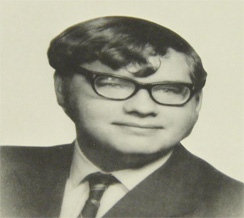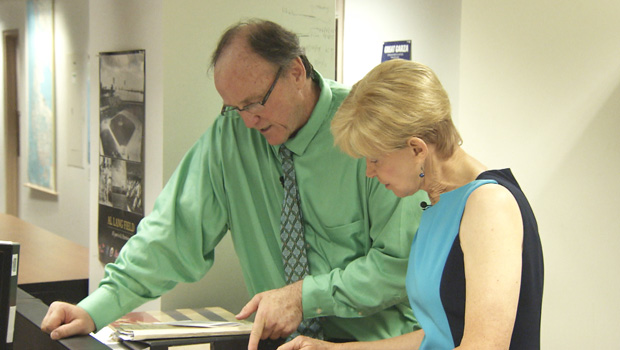On the trail of missing persons
When a person goes missing there's no guarantee that they'll ever be found. Much depends on the determination of the person who's pressing the search. Our Cover Story is reported by Susan Spencer of "48 Hours":
Tampa Bay Times writer Andrew Meacham is in the story-telling business, but one story from his own past haunts him: That of his childhood friend Stewart Fletcher Currin.
They first met in the fifth grade. "He wasn't gonna be a jock, he wasn't gonna be a movie star," said Meacham. "But he could be the smartest kid in the room."
Fletcher's early brilliance seemed to promise a bright future. But beginning in the 1980s, his behavior became increasingly strange.
"I remember hearing about Fletcher believing that the FBI and law enforcement were attacking him with high-intensity beams of magnetic light," Meacham said. "His mother finally got him to see a psychiatrist. And he accused the psychiatrist of being in on the plot."
Diagnosed with paranoid schizophrenia, Fletcher began leading a transient life. He fell out with his family, and then seemed to fall off the Earth.
The last time Meacham saw Fletcher was around late August, 1999. "I had a sense that the future was shifting, and not in a good way," he said.
The last time ANYONE saw Fletcher was a month later, sleeping on a roadside bench in Seminole, Florida. At the time, he was 44.
"To be here and to just disappear is not something anybody expected," Meacham said. He admits that finding Fletcher soon became an obsession.
"It took years," he told Spencer. "I looked for people on the street, somebody with brown wavy hair."
He even worked with a detective.
"Not a trace," said Meacham. "No contact with law enforcement, not showing up as receiving any benefits. No one's heard from him. How does somebody fall through the cracks like this?"
Sadly, it's not all that hard.
In this country, at any given moment, there are roughly 84,000 people classified as "missing." That is more than enough to fill every single empty seat at the cavernous AT&T Stadium in Arlington, Texas, home of the Dallas Cowboys.
"There is no such thing as a disposable person," said B.J. Spamer. "Every one of these people matters."
Spamer is a director at NAMUS (the National Missing and Unidentified Persons System), based at the University of North Texas Health Science Center in Fort Worth.
NAMUS is the only federally-funded database of the missing and unidentified open to the public.
"Missing persons run the gamut, from your stranger-abducted child, to your runaway juvenile, to your adult who goes missing and we fear that foul play has occurred," Spamer said.
Like Fletcher, adults DO disappear. But laws are more geared toward finding kids.
"There is a federal mandate that if a child goes missing, a law enforcement agency will immediately take a report from family. There is not a federal requirement related to missing adults," said Spamer.
Which may be why no missing persons report ever was filed for Fletcher.
Out of other options, Meacham scoured the NAMUS reports on unidentified remains.
"When you can't find him alive, you have to start wondering if he's somewhere dead," he said.
He hit on NAMUS case number 99-1145, an unidentified man found dead of a heart attack on a bench five days after Fletcher was last seen, and just five miles away. But Meacham was unconvinced. "The image that was accompanying this entry on the NAMUS database didn't look enough like him," he said.
He compared that image -- an artist's rendering of what the unidentified man looked like when alive -- to Fletcher's state identification photo. He still wasn't sure.
"I think he was frustrated, because he couldn't quite tell if that was his friend or not," said Dr. Bill Pellan, who heads up investigations for the Medical Examiner's Office in Pinellas County, Florida, where the unidentified remains were housed.
The office has a high success rate in finding the missing. But in Fletcher's case, there was little to work with. No fingerprints, no obvious way to get DNA.
"His friend's immediate family had all died," said Dr. Pellan. "And so obtaining DNA from family members to compare to our unidentified person was not possible."
But then Meacham remembered a letter Fletcher had written to him almost two decades ago, in the days when people still licked envelopes.
Would it be possible to extract DNA from saliva under the envelope's seal?
"I've never heard of making an identification using an envelope," said Dr. Pellan.
"I was expecting that they would say, 'It's too corroded, it's too old,'" said Meacham.
But after weeks of work, the DNA team astonished everyone. They opened the envelope's sealed flap and were able to extract DNA from 1996. "Isn't that amazing?" said Dr. Pellan.
So they had Fletcher's DNA. But was it a match?
"Whatever answer you get, it's not going to be good," said Spencer.
"That's right," said Meacham. "But at least it's an answer."
Spencer talked to Meacham a day before he would find out. She asked, "What does your heart tell you?"
"My heart tells me ... I don't think it's him," he replied.
And the next day, in Pellan's office, the long-awaited news. "Based on that full profile from the envelope, your search for Fletcher is over," said Dr. Pellan. "You found him."
First came shock, then grief, but also relief. "I'm just blown away," Meacham said.
Weeks later, on a warm summer morning in Olivia, North Carolina, Meacham joined a small gathering to bury Fletcher's remains in the family plot.
"The Lord shall preserve thee from all evil. He shall preserve thy soul. The Lord shall preserve thy culling out and thy coming in from this time forth, and even forever more."
Sixteen years after Stewart Fletcher Currin died alone and unnamed on a roadside bench, his childhood pal was able, at last, to say goodbye.
Spencer said, "You have turned out to be an amazing friend."
"I think I've turned out just to be 'a' friend, you know?" Meacham said. "I mean, this is what friends do. You don't let each other just disappear. And I'm sorry that I waited so long."
For more info:
- National Missing and Unidentified Persons System (NamUs), UNT Center for Human Identification's Forensic Services Unit
- District Six Medical Examiner's Office, Pinellas County Forensic Lab
- Andrew Meacham, Tampa Bay Times

